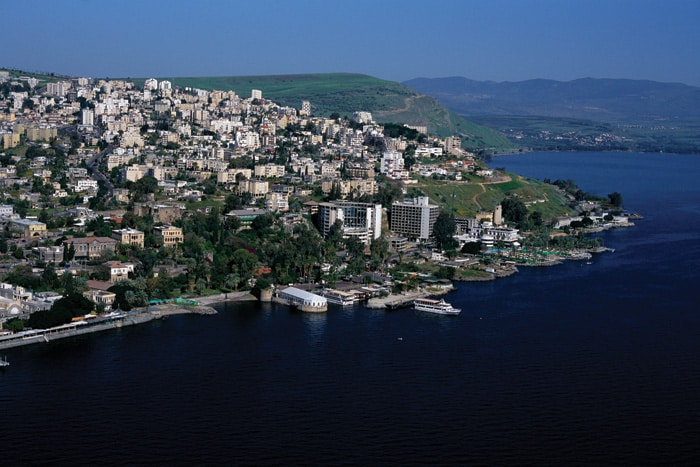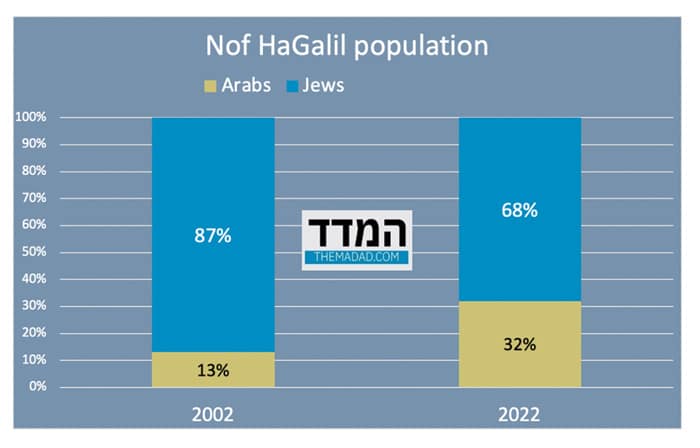 Sea of Galilee
Hanan Isachar/Getty Images
Sea of Galilee
Hanan Isachar/Getty Images There is no debate about one thing: The share of Jews in the Galilee region is decreasing. It has decreased from about a quarter to less than 15%. On all other issues there is a debate. Why do Jews leave? Are Jews discriminated against, or Arabs? Are state institutions sabotaging the strategic goal of “Judaizing the Galilee”? Should there be such a goal? Is such a goal a ‘Zionist’ or a ‘racist’ goal? Is it a realistic goal?
Try to grapple with these sensitive questions, and you get a headache. They involve policies of the Israel Lands Administration, of the Minister of Housing. They involve construction in Arab settlements and a different policy for development in Jewish settlements. They involve the rules governing Admission Committees, which cause Jewish settlements to remain small. They involve environmental concerns, and building of high-rises and the character of rural villages.
They involve the thorny question of whether and to what extent Israel is already a normal and capitalist country, in which regions can just obey the rules of supply and demand. Or maybe Israel isn’t quite normal: It is a country in which a battle is still waged (usually without violence) over the question of who is the true possessor of the Land, Jews or Arabs. In such a case, the nation-state of the Jewish people must prevent Arab dominance in an important region, lest one day it seeks to break away.
Israelis who raise the alarm warn of an Israeli “Donbas region”. This is the area in Ukraine that is densely populated by Russians, and thus became a magnet for dispute. The alarmists remember that in the original partition plan, the heart of the Galilee, from Nazareth to the Lebanese border, was not intended to be a part of Jewish Israel. Demographic trends may strengthen an Arab drive to divide the land, not within the framework a 1967 “two-state solution,” but rather within the framework of a much less Israel-friendly 1947 “two-state solution.”
Part of the problem stems from the fact that Israel is supposed to behave as a normal country, governed by law, even when it faces a challenge that is not quite normal.
Take this important question and add a bubbling cauldron of politics, of sectoral interests, of farmers and real estate developers, of ideological battles. What you get is a chaotic and incoherent policy. The State of Israel does not say what it wants, and when it does, it does not act in a consistent way to meet its objectives. One must admit: part of the problem stems from the fact that Israel is supposed to behave as a normal country, governed by law, even when it faces a challenge that is not quite normal. On the one hand, Israel must guard equality. On the other, such conduct could lead to a result that complicates its strategic objectives.
This tension between values and interests is nothing new. Similarly, the attempt of each side of the debate to present the other side’s position in a negative light is not new either. The defenders of equality will present the promoters of Jewish settlements as racists, without taking seriously the demographic challenge in the Galilee. The promoters of Jewish settlements will present the defenders of equality as anti-Zionists, without taking seriously the need to have civil equality.
Why is this suddenly important? Because the Israeli government has decided to draft a new policy that will deepen the “subsidy for land use in areas of national priority.” The “priority” according to this new policy refers to “demographic and/or security distress.”
What this policy could mean, how it would be implemented and whether it would pass legal tests remain to be seen. The difficulties of implementation in the Galilee will reignite the debate on whether a “legal reform” is essential. The government is expected to resist legal barriers, and in case they materialize to pull its usual complaint about the court’s tendency to block required policies.
But what will happen in the Galilee? Let’s go back to looking at facts we could agree on. First, Arabs too need to live somewhere. Second, Arabs and Jews do not always get along when they share a space. Three, where there is a clear dominance of one population, the other population tends to leave. In other words, if Israel wants to have Jews in the Galilee, and in a significant proportion, it must strengthen their ability to live together, in numbers that will provide them with a sense of security and control over the compounds where they live. And four, the current policy does not correspond with fact number three. That is, it needs to change, either by giving up on the idea of strengthening the Jewish presence in the Galilee and coming to terms with a challenging demographic reality, or by dedicating resources and outlining plans that would tempt more Jews to live there.
Something I wrote in Hebrew
The talks on possible compromise concerning the Judicial Reform made me write this:
President Yitzhak Herzog proved that the institution of the presidency is still necessary in the State of Israel. He proved that it has meaning, in an age where, every time a president is elected, the question is asked anew, why does Israel need it. Here is the answer: Israel is a country whose political system is polarized (the public is less polarized, but that is a topic for another discussion). Often, it is polarized to the point of stupidity – the politicians put themselves on high trees and are unable to come down from them on their own… This is where Herzog comes in. A President with a ladder.
A week’s numbers
The town Nof HaGalil (formerly Upper Nazareth) was established to lure and settle Jewish population in the heart of Galilee. With time, Jews move out while Arabs move in (see article on the left hand side).

A reader’s response:
Jody Abramson asks: “What ever happened to the Israel-Lebanon gas deal?” Answer: Google it, it seems to work for the benefit of both countries. And BTW, another gas field was discovered off Israel’s coast just two-three weeks ago.
Shmuel Rosner is senior political editor. For more analysis of Israeli and international politics, visit Rosner’s Domain at jewishjournal.com/rosnersdomain.























 More news and opinions than at a Shabbat dinner, right in your inbox.
More news and opinions than at a Shabbat dinner, right in your inbox.